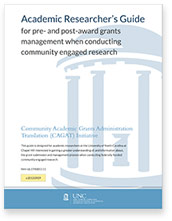CAGAT Initiative holds second webinar for community academic grants administration

UNC's Community-Academic Grants Administration Translation (CAGAT) is an initiative designed to help improve the grants management infrastructure for community-academic partnered research through the collaborative development of guides and webinars.
CAGAT's second webinar: Introduction to the Academic Researcher's Guide: Tips for Communicating with Your Community Partners During the Post-Award Process, will be held at Rosenau Hall (room 230) on May 19, 2016 from 12:00pm-1:30pm. Participants can attend in person or online.
The webinar will identify effective strategies for communicating during the post-award stage of the grants management process with community partners, business office staff, and research administrators. The presenters will provide tips on what information to share with community partners regarding timelines, progress and financial reporting, invoicing, cash advances, and project close-out.
Learn more and register here »
See also: New resource helps investigators avoid common pitfalls of community-engaged research »